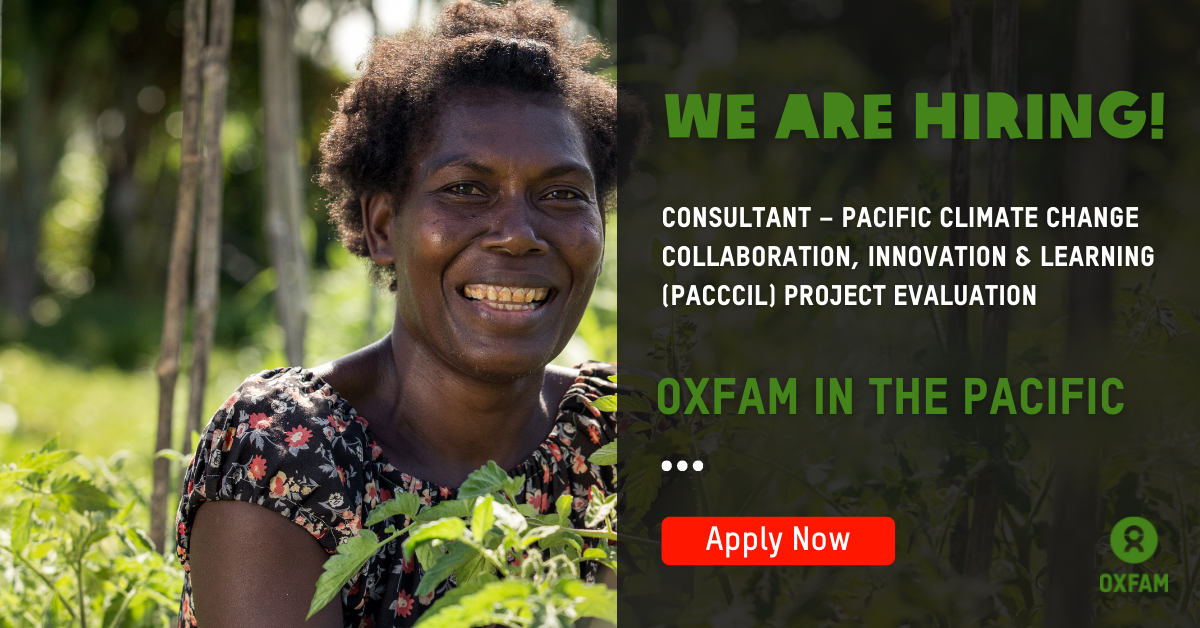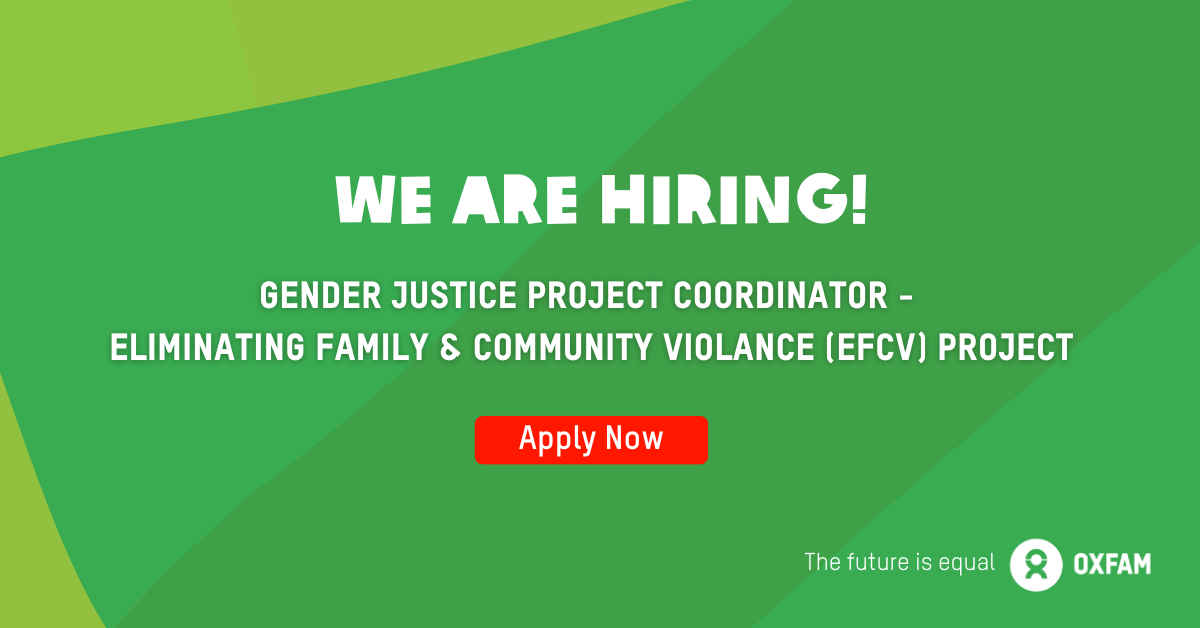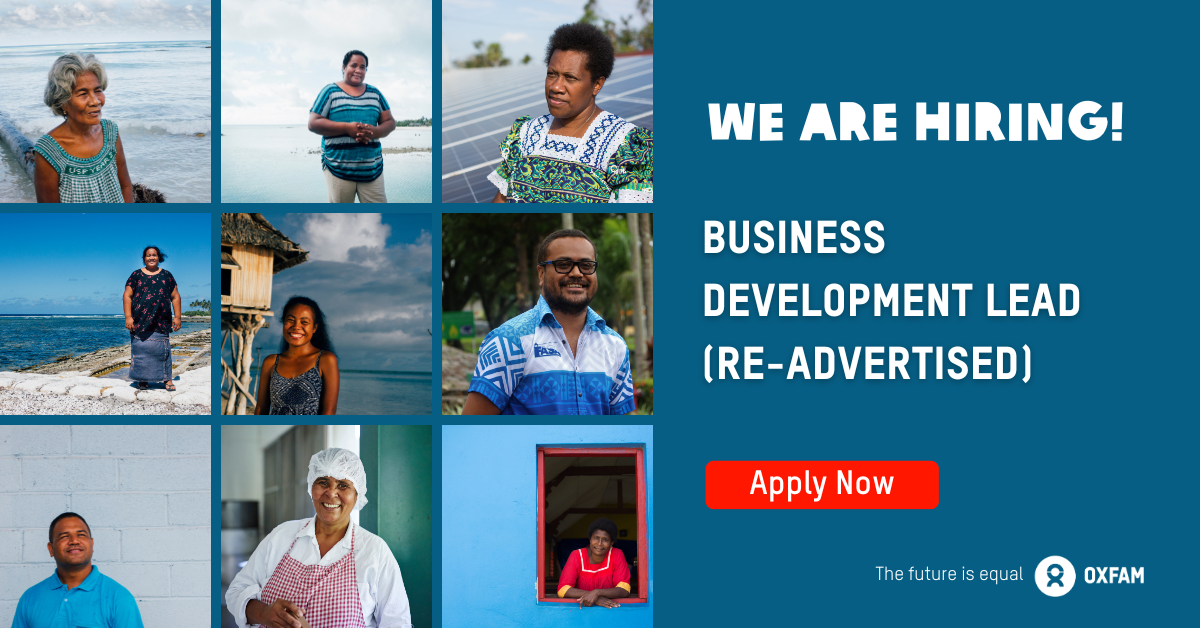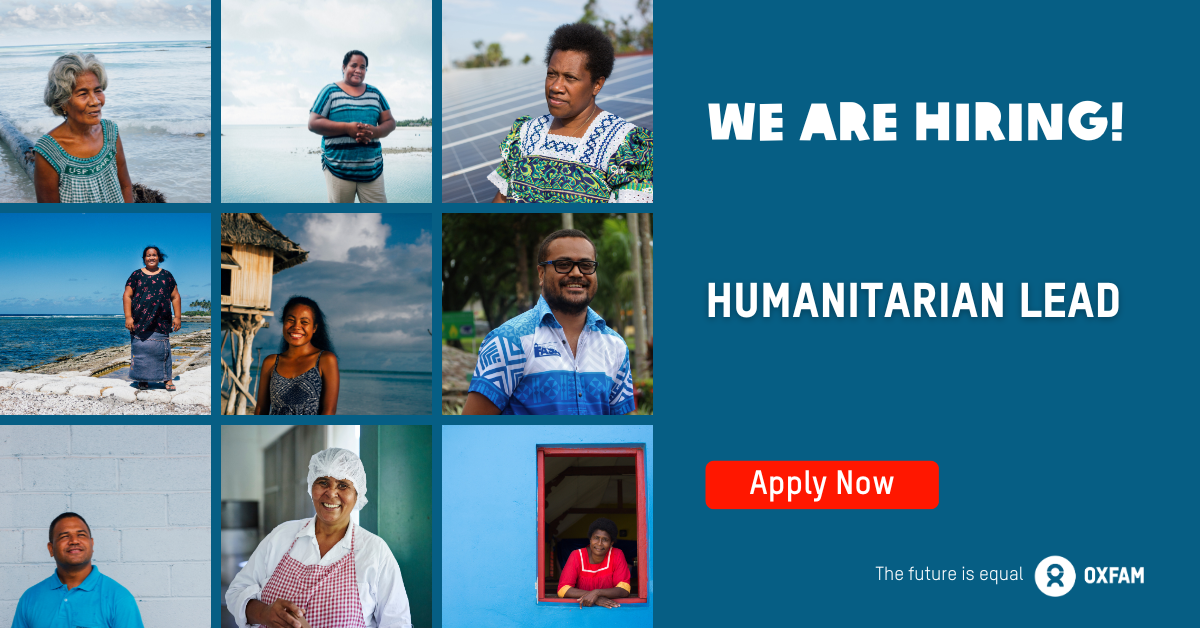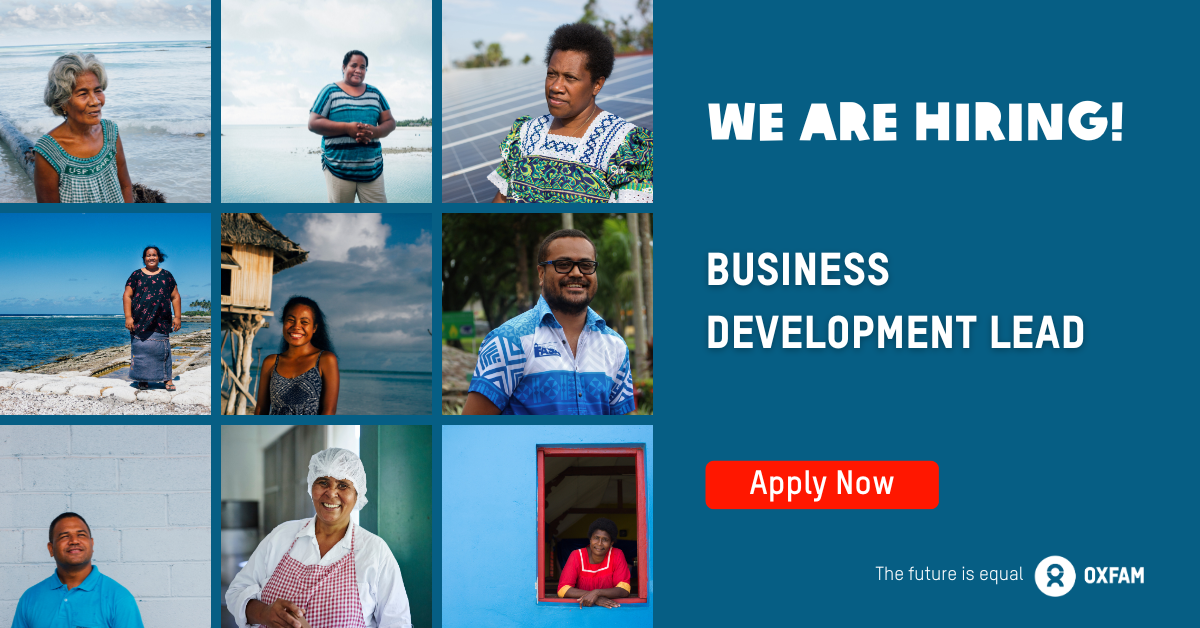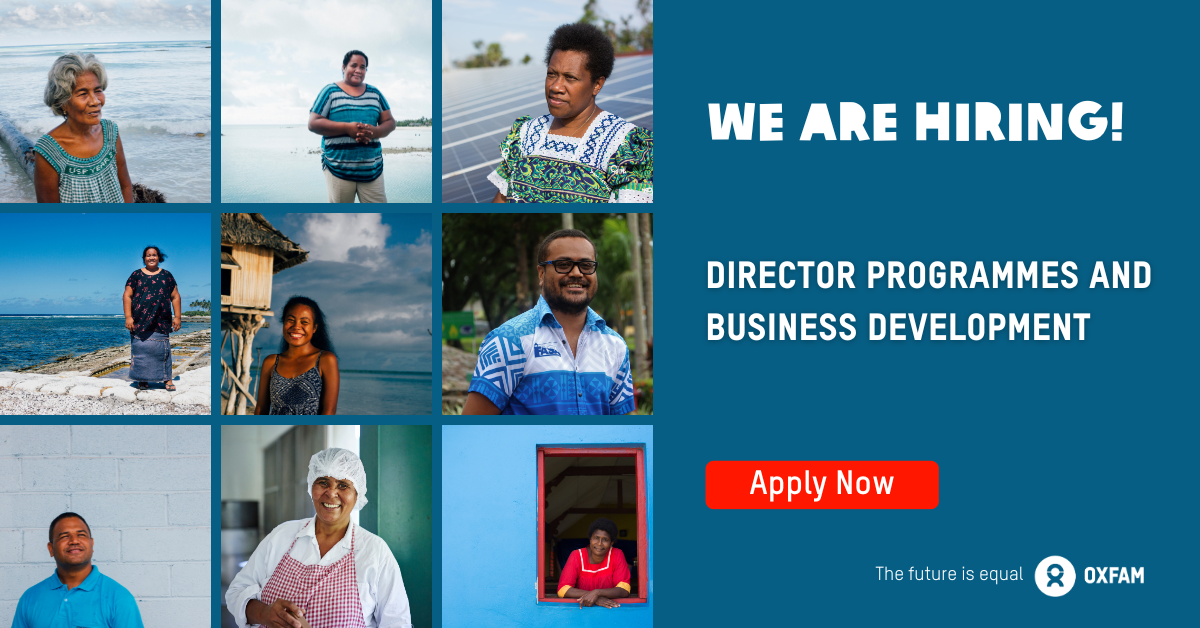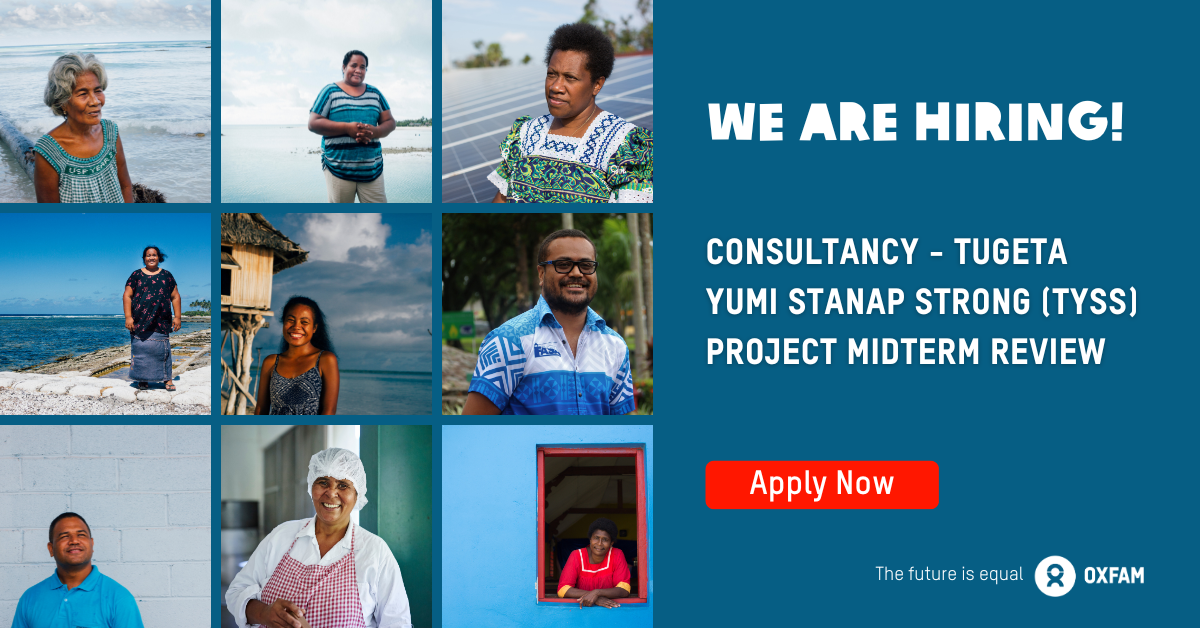OXFAM IN THE PACIFIC VACANCY
CONSULTANT – PACIFIC CLIMATE CHANGE COLLABORATION, INNOVATION & LEARNING (PACCCIL) PROJECT EVALUATION
- Expressions of Interest will close on: 12 August 2022 at 5PM FIJI Time [GMT+12]
- Location of role: Flexible within the Region
- Term: 25 days minimum (August to September)
- Reporting to: Manager PACCCIL
- The Terms of Reference is available for download
- Please contact Recruitment Co-Ordinator Divono Vakatale for any questions: [email protected]
- Oxfam in the Pacific accepts Online applications only
The full advert and online application form is available on this link: https://oxfampacific.bamboohr.com/jobs/view.php?id=183
The Role
Background
Oxfam is a world-wide development organization that mobilizes the power of people against poverty. In the Pacific, we work with our partners to ensure that Pacific Islander women and men (specifically those that are poor, marginalized or excluded) are leading and shaping their development and that their voices are heard, and acted on by those in power. Oxfam’s Pacific regional office is based in Suva, Fiji. This is also where our Fiji country office and our base for remote cluster management of the Polynesia/Micronesia country office are located. We also have offices in Papua New Guinea, Solomon Islands and Vanuatu.
Oxfam in the Pacific (OIP) has been working on a new regional climate change program called the Pacific Islands Climate Change Collaboration, Influencing and Learning (PACCCIL) project. This is a four-year (2018 – 2021) project funded by Australian NGO Cooperation Program (ANCP).
The Pacific Climate Change Collaboration, Influencing and Learning (PACCCIL) project is strengthening the influencing capacity of local civil society actors and networks to ensure that actions on climate change in the Pacific region are effective, inclusive, and collaborative. Oxfam’s regional climate change project is implemented in Solomon Islands, Vanuatu and Polynesia/Micronesia region. This is a five-year project that began in June 2018 – June 2022 with an Extension ending June 30th 2023.
Oxfam in the Pacific is working/partnering with
- PICAN the Pacific Islands Climate Action Network who are providing regional climate action leadership
- VCAN the Vanuatu Climate Action Network as a country partner
- Solomon Islands Climate Action Network (SICAN) who is also a country partner.
To achieve its goal the project has three key outcomes:
- Outcome one: Pacific civil society networks effectively influence national, regional and global climate change and disaster policy and practice.
- Outcome two: Civil society, government and private sector collaborate on a range of climate change and disaster issues.
- Outcome three: good practice in the region is being redefined, influenced by learning and research from the project.
The PACCCIL project is convening platforms, brokering discussions, and facilitating dialogues at local, community, sub-national, national, regional, and global spaces. The project is amplifying and coordinating the voices of vulnerable and marginalised communities to influence the climate change discussion. In addition, addressing regionally relevant aspects of climate change.
- Climate Justice and Ocean Justice: Challenging the inequalities because of the current governance systems with a call for move towards progressive, transformative, inclusive, accountable systems.
- Low Carbon: To ensure, that Pacific Islands actively engage in the ambitious 1.5 degree world consideration at all platforms that Pacific Islands countries are represented in.
- Climate Finance: Ensuring the social accountability of climate finance and the need for fairer finance flows to Pacific Island Countries as well as the equitable distribution of these benefits amongst the most vulnerable groups in society.
- Climate Change and Covid-19: The double effects of climate change and Covid-19 for the region are amplified at international, regional and national spaces.
- Loss and Damage: To ensure the Pacific voice is not lost in discussions happening at global spaces on loss and damage.
At its heart the project is setting out to strengthen two existing climate action networks and establish a third – Pacific Islands Climate Action Network (PICAN) and Vanuatu Climate Action Network (VCAN) and Solomon Islands Climate Action Network (SICAN) respectively.
Target Audience:
The consultant will work with the PACCCIL project, its contractual partners Vanuatu Climate Action Network (VCAN) and the Solomon Islands Climate Action Network (SICAN), non-contractual partners PICAN and stakeholders to assess the effectiveness, relevance, efficiency and sustainability of the PACCCIL Project in the countries that it operates in. Oxfam will also be part of the audience as it has played a critical role in resourcing partners. Insights from this consultancy will shape the evaluation and to tease out impacts we wish to record future learning within the Climate Justice Programme.
Oxfam through PACCCIL defines Partners into these 4 dimensions:
- Secretariat support to the three networks (VCAN, SICAN and PICAN). This includes convening, documenting and facilitating meetings. Supporting network members with technical policy advice, logistics and communications materials for key influencing moments. Secretariat staff will often represent the networks at influencing opportunities. The PICAN secretariat role was one person seconded into the role. VCAN’s secretariat included three Oxfam staff members for some of the time (network coordination and influencing support) and for SICAN it was two Oxfam staff members (network coordination and influencing support). All secretariat roles are managed by Oxfam and bound by Oxfam policies and procedures.
- Joint learning – Networks manage this differently. In SICAN there are monthly site visits and quarterly learning from peer’s sessions run by network members. Media training there also included network members providing leadership and content. Oxfam offers a range of specialist training and support, including organisational capacity assessment, influencing capacity assessment, media and communications training. Oxfam’s priority policy areas are: Climate Justice and Ocean Justice, Low Carbon, gender and Climate Finance and social accountability. Oxfam brings a portfolio of support offerings and networks choose what they would like to take up.
- Network development – Oxfam through the Secretariat functions has supported the registration of all three networks, allowing for increased legitimacy, investment, and influence. The organisational capacity assessments have been made available as a tool for networks to identify and prioritise their learning needs.
- Allied action – Policy advice, information exchange and co-strategizing at key national, regional, and international influencing moments.
Purpose and Structure
Oxfam in the Pacific, through its regional Pacific Climate Change Collaboration, Influencing and Learning Project (PACCCIL) provides financial support through funding of the Secretariat positions for VCAN and SICAN and certain activities from the financial year of 2018/19 to date. Now as part of its evaluation, the project wishes to achieve the following:
- Evaluate and document the quality and impact of the project.
- Enhance mutual accountability, transparency and learning between the communities, partners and allies with whom we work, ourselves and our donors,
- use the consultancy outcomes to influence the practice and accountability of other actors in the development sector, including governments, private sector actors, other INGOs, and civil society organizations, and strengthen our credibility as an international non-governmental organization working in development.
Consultancy Objectives
The consultant that will be responsible in seeing the objectives through are required to:
- Lead the evaluation to unpack and assess progress towards PACCCIL’s outcomes
- Identify the reasons behind achievements (or lack of progress) against objectives. Oxfam expects sufficient analysis to determine, for example if a program or project is not achieving objectives, whether the problem rests in the theory of change, or with difficulties in implementation, and whether these are leading to unintended (positive or negative) consequences (Effectiveness);
- Assess whether the objectives are ultimately contributing to the realization of Oxfam’s mission (Effectiveness).
- Evaluate Oxfam’s contribution and value-added to the project outcomes and impact (Effectiveness);
- Unpack the extent to which the intervention is suited to the priorities and policies of partners, with specific reference to the experiences and opinions of women, children and persons with disabilities and other marginalized groups (Relevance);
- Assess the degree to which the financial resources of the project or program have been used economically and efficiently (Efficiency); and
- Build evidence-based recommendations for exiting, scaling up, handover or other types of transitions (Sustainability).
Learning and Knowledge Questions:
Learning questions, the project wishes to have answered in this process are as follows:
- What does the evidence tell us about project’s progress towards its outcomes?
- What other evidence do we need to tell us a complete story?
Methodology:
It is anticipated with current COVID19 precautions and restrictions, that this review will be conducted through a hybrid mode where the consultant will be required to travel to Fiji, Vanuatu and Solomon Islands, as well as the use of online tools for interviews should key informants be unable to meet face to face. As methodology, the ToR suggests a qualitative approach with a combination of the following methods:
- Document review – With the project immense Mid Term Review, Partnership Review, Situational Analysis as well other pockets of monitoring work. It is highly suggested that a cross examination of all documents related to the project since its inception to date be reviewed and assessed as evidence.
- Appreciative Inquiry and Learning Review: Following a document review, its suggested that the project be assessed for its strengths as opposed to its flaws. This is through the following Four Ds:
- DISCOVER: What gives life? What is the best? Appreciating and identifying processes that work well.
- DREAM: What might be? What is the world calling for? Envisioning results, and how things might work well in the future.
- DESIGN: What should be–the ideal? Co-constructing – planning and prioritizing processes that would work well.
- DESTINY (or DELIVER): How to empower, learn and adjust/improvise? Sustaining the change
Data collection methods will consist of qualitative techniques, including a secondary review of data from documentation and the collection of primary data from online interviews of partners. Methods used should include consideration of cross-cutting issues such as gender and disability and should include perspectives of all stakeholder groups. The consultant will be expected to be flexible enough to perform key informant interviews through a HYBRID mode including via skype, telephone, email, google docs and forms, Box, Zoom among other relevant online tools and travel or face to face. The best method of primary data collection will be determined through consultation with the Oxfam consultancy management team. In addition to the methodology identified, in the initial stages of the consultancy the successful consultant is expected to develop and present to the PACCCIL Project team a detailed methodology and workplan on how this work will be conducted.
Proposed Research Questions:
The consultant will continue to refine and propose research questions in line with the learning questions provided in these terms of reference in consultation with the PACCCIL MEAL Coordinator and the PACCCIL Project Manager.
Duration and timing
This work will be carried between the August 15 – Sept 30 for a duration of 25 working days. This is to ensure that on-going work for the consultant concurrent to this consultancy is also taken care of and that the report goes through a thorough review before it is finalized within the duration of 25 days. The Final Report and Publication is to be submitted no later than September 30th.
Resources
- Oxfam in the Pacific through the Pacific Climate Change Collaboration, Influencing and Learning (PACCCIL) Project documents (i.e., annual performance reporting, partner reporting)
- Project Report Case Studies/ Impact Stories
- Mid-term review report
- Partnership review report
Payment Schedule
Payments for the consultancy daily rate will be discussed as detailed on the Terms of Reference.
Institutional Arrangement
- The consultant (he/she) will be Pacific, Australia or New Zealand based
- The consultant is to provide his/her own laptop or computer and all materials required for the assignment
- All deliverables are to be submitted for review and approval by PACCCIL Project Manager and MEAL Coordinator
- The consultant will communicate with regional partners using online platforms
- All program documents required for this review will be provided to the Consultant through the MEAL Coordinator and Project Manager.
You Will Have
Selection Criteria
- Experienced Evaluation Professional with Skills in Communications and Learning.
- Familiarity in working with national, regional and international organisations with some familiarity with grassroots developmental issues in Pacific Island countries
- Familiarity in working with Pacific civil society organisations and Pacific governments
- High-quality research skills with the ability to analyse, synthesize and summarize complex information
- A clear and succinct writer
- Availability from August – September
How to Apply
Send in.
- Detailed expression of interest with clear research methodology, work plan and budget for the consultancy
- A results-oriented CV detailing specific evaluation experience with evidence of conducting qualitative reviews in previous assignments.
- Two Reference letters (if available at the time of application)

